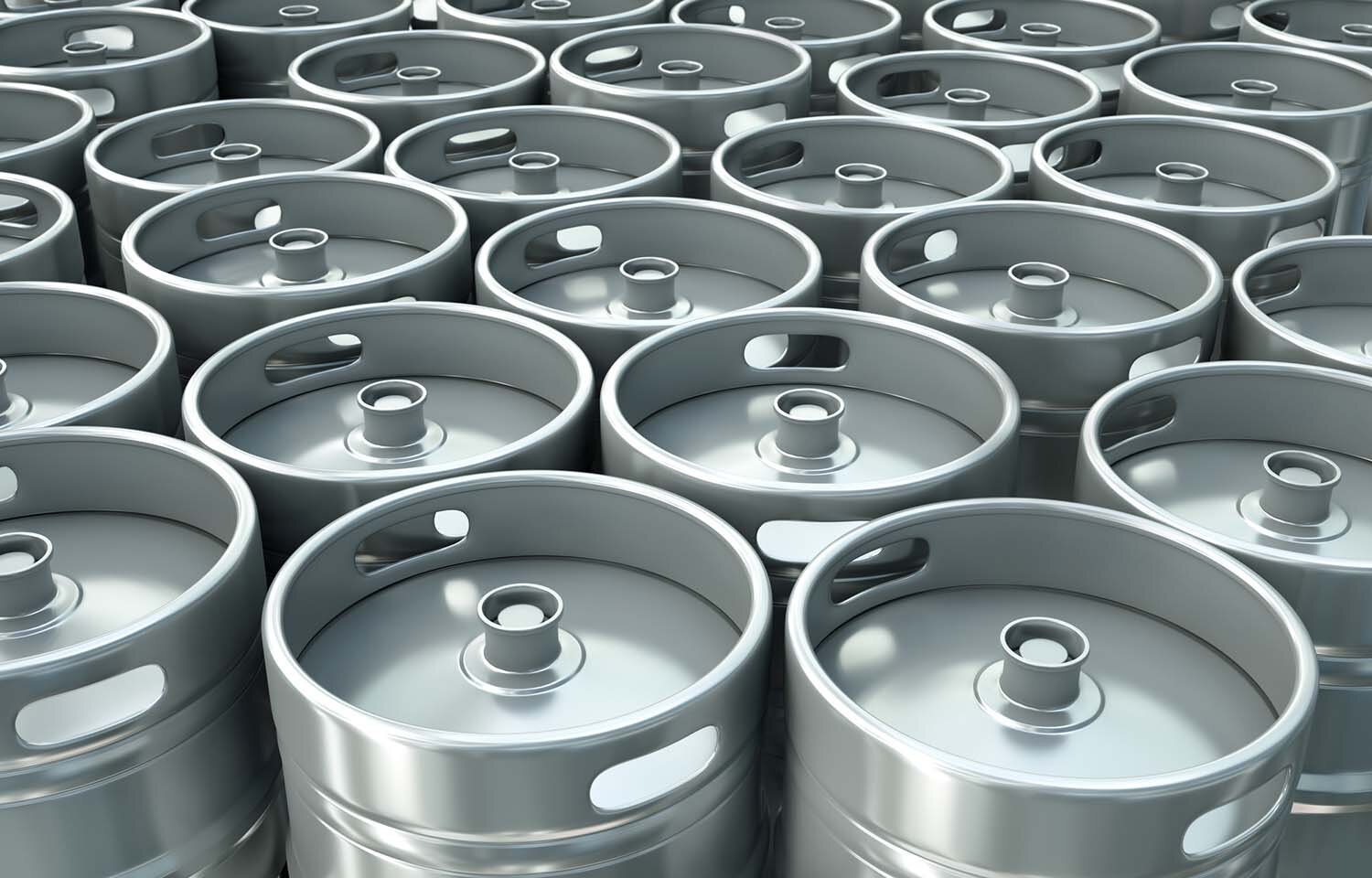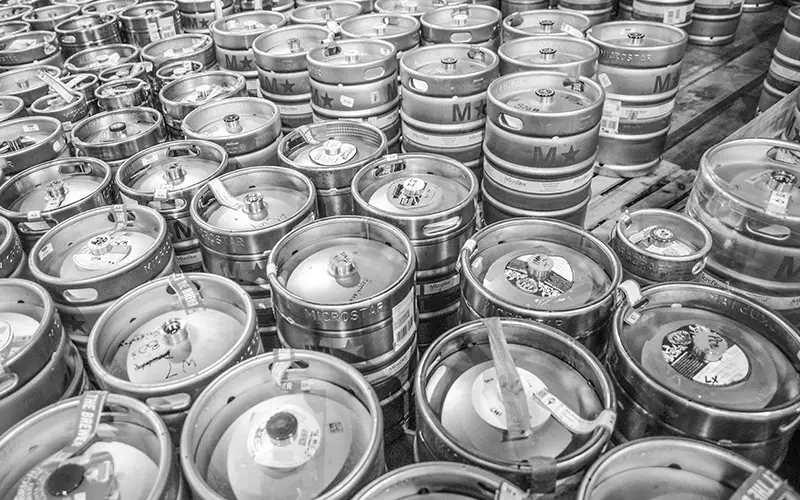A keg offers us ideas of a classic metal barrel filled with your favorite beer at a vibrant party or a quaint local brewery. Furthermore, kegs come in a variety of forms and sizes, demonstrating the amazing diversity and creativity in their construction materials over the years.
In this intriguing article, we’ll take a fascinating tour into the world of kegs and learn about the many materials used to make them.
Table of Contents
ToggleDifferent Materials of Kegs

Stainless Steel Kegs
The most common and commonly used variety in the beverage sector is stainless steel kegs. They are widely recognized for their extraordinary longevity, incredible strength, and remarkable capacity to keep the contents of the highest quality.
These kegs are made of food-grade 304 stainless steel, which is non-reactive and corrosion-resistant. The smooth, polished inside of stainless steel kegs ensures that the flavor of the beverage is fully kept, making them an excellent choice for keeping beer, wine, and other beverages.
Stainless steel kegs are not only easy to clean and maintain, but they also allow for long-term reuse, which is fantastic! Because of their durability, they are ideal for both commercial usage in breweries and homebrewing aficionados.
Aluminum Kegs
Aluminum kegs are an excellent alternative for goods such as soda, carbonated water, and some craft beers, particularly in the beverage sector. These kegs are exceptionally light, making them a breeze to move and manage. Furthermore, because aluminum is extremely recyclable, these kegs are an excellent choice for the environment.
One amazing benefit of aluminum kegs is that they provide an excellent barrier against light and oxygen, ensuring maximum preservation of the beverage’s freshness and flavor. Aluminum kegs, on the other hand, are highly sturdy and can survive a lot of use. While not as sturdy as stainless steel kegs, they remain a dependable solution for many situations.
Plastic Kegs
Plastic, especially high-density polyethylene (HDPE), is a novel material utilized in the manufacture of kegs. Plastic kegs are extremely lightweight, making them a breeze to move and stack. They are a less expensive choice than stainless steel or aluminum. These kegs are extremely adaptable and can be utilized in a variety of situations, making them ideal for outdoor events and big groups. They are simple to use because of their mobility and user-friendly design.
Depending on the manufacturer’s design, plastic kegs can be either disposable or reusable. Plastic kegs with bladder systems are meant to collapse when the beverage is distributed, preventing air from entering and keeping the drink fresher for longer.
Wooden Kegs
Although they are becoming less prevalent, wooden kegs have a long history as traditional receptacles for storing and transporting various liquids such as beer and wine. Wooden kegs are exquisitely constructed from oak or other hardwoods, which improve the tastes of stored beverages as they age gracefully.
Modern wooden kegs are mostly used for improving the flavor and complexity of specific types of beer or spirits, making the drink even more unique and pleasurable. Despite their porous nature and increased care requirements, wooden kegs have a certain charm and are utilized for special events.
Kegs have come a long way since their beginnings, and the materials used to construct them have consistently developed to meet a wide range of demands and tastes.
Why Are These Kegs Used?
For generations, kegs have been an invaluable asset to the beverage business, providing a practical and effective option for storing, transporting, and serving a wide range of liquids. Their use spans a wide spectrum of beverages, with beer being the most well-known, but they are also fantastic for other drinks.
Beer Storage and Dispensing
Kegs are the beer industry’s lifeblood, delivering delight and satisfaction to beer consumers worldwide. Breweries may keep their excellent beer in big stainless steel or aluminum kegs before bottling and delivering it to beer enthusiasts all over the world. These kegs are available in a number of sizes to meet a variety of demands, ranging from tiny kegs excellent for household usage to huge kegs suited for industrial use.
By employing kegs to dispense beer on tap, bars, pubs, and restaurants may improve the beer-drinking experience. Customers may enjoy the delectable flavor of freshly poured pints while also decreasing the need for individual bottles or cans.
Wine Storage and Aging
Not only is wine commonly associated with bottles, but some wineries are also adopting casks for specific applications! Stainless steel kegs are an excellent option for storing and dispensing wine, particularly for wines that are intended to be consumed rapidly or by glass. Kegs can also be used to age wine, creating a unique maturation environment compared to traditional oak casks and presenting an innovative method for serving and preserving wine on tap.
Beverages that are Carbonated
Kegs are an excellent method to store and serve carbonated beverages, including seltzer, carbonated water, and sparkling cider. The pressurized environment inside the keg is essential for preserving the carbonation of the beverage, ensuring that each portion is dependably fresh and carbonated.
Cold Brew Coffee and Nitro Coffee
In recent years, cold brew coffee has acquired immense popularity, and kegs have become the preferred method for preserving and dispensing this exceptionally smooth and flavorful coffee concentrate. Nitro coffee, which is imbued with nitrogen gas to produce a delightfully rich texture, is also typically served from kegs, similar to draft beer.
Numerous bars and establishments have avidly adopted the use of kegs for pre-mixed cocktails and mixed beverages. This method streamlines the beverage preparation process during hectic times, reduces waste, and ensures drink quality consistency.
Kegs are not limited to alcoholic beverages; they are also ideal for preserving and dispensing water, juice, and a variety of non-alcoholic beverages at parties, festivals, and other gatherings. Kegs are a popular option for gatherings, anniversaries, and outdoor activities because they allow for the efficient service of large quantities of beverages. Portable keg dispensers and keg trailers make serving beverages in remote locations immensely convenient, eliminating the need for individual bottles or cans.
Many homebrewers appreciate the convenience and space-saving advantages of kegs for storing and serving their delectable homemade beer and other beverages. This allows them to readily enjoy draft-quality beverages without the need for bottling.
Conclusion
Whatever keg material you come across, each one performs an important role in providing joy to enthusiasts all around the world through their pleasurable drinking experience.

I am a passionate beer connoisseur with a deep appreciation for the art and science of brewing. With years of experience tasting and evaluating various beers, I love to share my opinions and insights with others and I am always eager to engage in lively discussions about my favorite beverage.
















